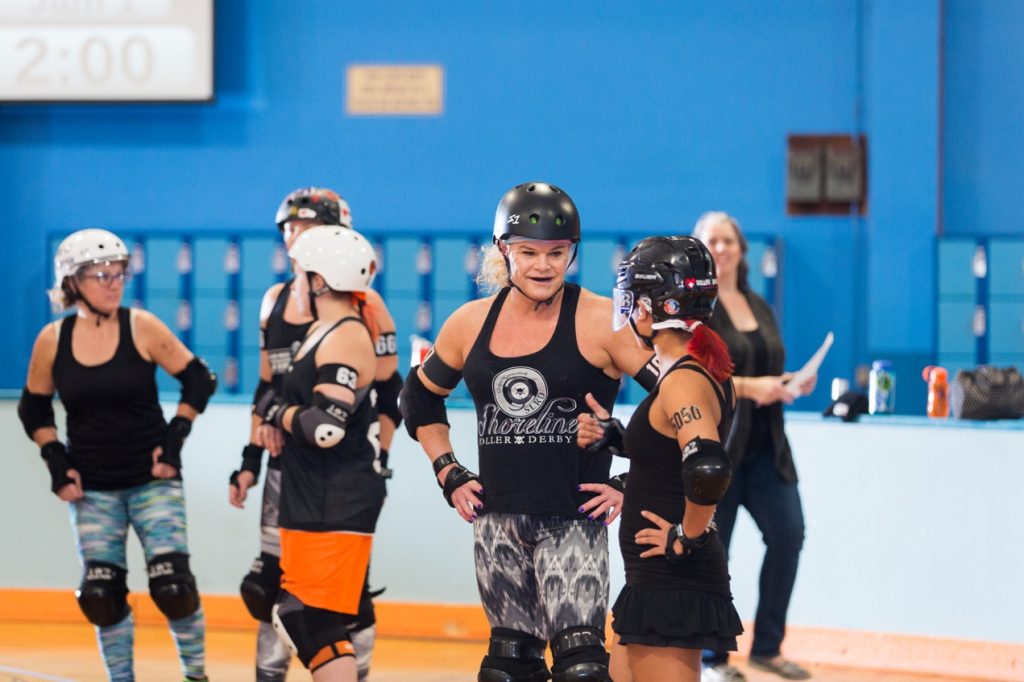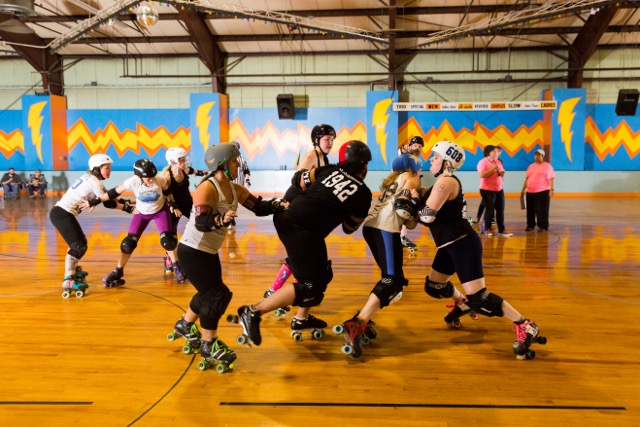People of all identities enjoy a game of hard knocks
By Jane Latus
If you have any preconceived notions about roller derby – well, don’t. If you envision women zooming around a banked track in fishnets, tripping, punching and elbowing each other, you’re both wrong and old enough to remember the staged-for-TV roller derby of the ’70s. And if you think players are all tattooed, hard-partying lesbians – surprise: they’re not even all women. Today, roller derby includes everyone. Everyone, that is, looking for a full contact, strategic sport. Must be unfazed by bumps and bruises. Must learn to skate well enough to jump over fallen bodies. What doesn’t matter is gender, orientation or size. It’s Sunday night at Ron-A-Roll in Vernon, and Hartford Area Roller Derby (HARD) has invited other leagues to a scrimmage. Fans have brought folding chairs to watch the helmeted, padded skaters give it their all. And that’s exactly what they do: jammer Lammy Adder! executes an impressive diagonal leap over opposing blockers, and speeds off with a satisfied grin. Instead of getting slammed down any old way, JESStifiable has perfected a dive that resembles a slide into base. One thing many people watching wouldn’t know is that these skaters are ages 18 to 61, transgender women, bisexual, queer, cis, straight and more, or that often men play, too. What is obvious is their passion for the game. Liberty Violence pulls on her skates, tears filling her eyes, and says with a slight tremble, “For me, derby is everything.” And yes, derby has historically been a lesbian draw, but it has evolved to be perhaps the most queer-inclusive sport going. “We definitely have a higher percentage of LGBTQ people than you’ll find in the general population,” says Marcy Mercury of New London, whose “government name” in derby lingo is Colleen Lavin. She joined Shoreline Roller Derby after college. “I really wanted to find a place to make some less-than-straight friends,” she says. “I identify as queer bisexual, and I know there are a lot of people on that spectrum. It was actually really validating for me, because in college you don’t meet a lot of bisexual people.” “That was part of why I joined, because I’m queer myself,” says BB-SK8 (Hamden resident Lyndsey Gress) of HARD. She stayed because, “I love the athleticism of it, the community of it, and I’ve made some really solid friends.”
Some derby basics

Roller derby is more accessible than its 1930s incarnation, since it’s now played on a flat track in any roller rink or gym. After fizzling in the 1970s, it was revived in the 2000s in today’s form of organizations run by and for athletes. A game, or bout, has two 30-minute periods, each with multiple two-minute increments called jams. Teams include a jammer and four blockers. Blockers hold back the opposing jammer while helping their own jammers pass. Jammers score a point for every opponent they lap. Skaters use their hips and shoulders to shove opponents, but must hit within the legal blocking zone – basically, the torso. Derby is equal opportunity for body types because whether jamming or blocking, small and large skaters can use their size to their advantage. Self-expression prevails Derby retains its camp traditions in the form of creative names and personal expression in dress. “A lot of thought goes into choosing a derby name,” says Scary Poppins (Lauren DeFoe of New Haven), who was a nanny when she chose her name and plays with Connecticut Roller Derby (CTRD). By day, Amanda Hutchinson of Ledyard is a journalist. But she is Fly By Night Fury with Shoreline, where she “found a place where I can be way cooler than I actually am.” A former player, she now coaches and refs in the sport. Team names range from all-business (Connecticut All-Stars) to aggressive (Cutthroats) to mischievous (Beat City Bedrockers). As for fishnets, you may still find them, depending on the team. HARD’s A-team wears a strict uniform. “They come out as a force,” says Mohammed I’lleatcha (Aisha Mohammed of Manchester), but its B-team gets creative with leggings or booty shorts. All are welcome, even non-skaters Connecticut has three leagues.
Shoreline, which practices in Plainfield, is all-gender. HARD in Vernon and CTRD in Waterbury are members of the Women’s Flat Track Derby Association and follow the association’s policy of admitting anyone except players identifying as male. There is no men’s league in Connecticut, but the nearby Mass Maelstrom, member of the Men’s Roller Derby Association, welcomes every identity. There two junior leagues for youths ages seven through 17: Connecticut Junior Roller Derby, which holds practices in Groton and Waterbury; and Constitution State Junior Roller Derby, based in Waterbury. JESStifiable (Jessica Firrin of New London) played just about every men’s sport “mostly for cover, because I knew I was a girl but I didn’t want anyone to know.” She joined derby as soon as she learned it welcomed her. “Not only was it challenging, and aligned with all the sports I’ve done, but it’s the only one that’s accepted trans women.” A spectator at one of her early bouts heckled her, but fortunately JESStifiable was too focused on the game to hear, and HARD issued a strong condemnation of the heckler’s behavior. Her biggest obstacle, JESStifiable says, was “I couldn’t skate!” Obviously, she learned. “I also learned how inclusive derby is. It’s a whole new community of strong, caring, powerful, badass women.” “A lot of people start out wildly uncoordinated … like drunken Bambis,” says BB-SK8. “You never see adults look so scared as new derby players.” The first trans woman skater in New England, Miss Identified (Andee Scallion of Hartford) joined HARD in 2012. Another team’s skater protested playing against a “male” player – but HARD stood up for her. “People have been so kind to me and very accepting. It’s really been a positive experience. There were a few bumps along the way, but the last few years especially have been remarkable,” says Miss Identified, now with CTRD. One “bump” was being frequently misgendered, but that inspired the derby name she loves. And she no longer has negative experiences. “Not in roller derby. In the real world, yes.” Derby’s diversity appeals to straight players, too: Deja VuDoo (Jocelyn Jenik of Old Lyme), who plays for the Shoreline Roller Derby out of Groton, calls herself “a straight, cis female and staunch LGBTQI ally. One of the joys of roller derby for me has been it has allowed me to develop lasting friendships with a more diverse group of people than I would normally encounter in my day-to-day life.” That diversity includes skaters’ professions: engineers, librarians, teachers, accountants, welders, web developers, scientists, nurses, retail workers, a student and an autopsy technician. CTRD President Sinnin Sonic (Heather Barron of Hamden) says derby’s popularity is surging and attributes that primarily to it being “all-inclusive. Every type of person can get involved, and it’s a different way to show strength and power. It’s a place you can go and be yourself. And it’s fun to smash into people.” Which raises derby’s real appeal: it’s fun, and not just to play. Says Sinnin Sonic, “Good derby is very fun to watch.” There’s hitting, but it’s strategic “I like landing good, clean hits! Taking someone out of play, oh yeah, it is so satisfying,” says BB-SK8. “I know it looks very chaotic, but on the track there’s constant communication.
There’s so much thinking. I don’t know any other sport where there’s so much rapid, active thinking.” Players extol the game’s physical and mental benefits. “It keeps me in shape, mentally too,” says HARD President Liberty Violence (Alana Angle of Bristol). “Part of becoming physically stronger and becoming proficient at those skills gives you confidence in real life,” says HARD’s Karma’kaz E. Killer (Alicia Bray of Windsor). “What I really like about derby is it gives women an opportunity to be aggressive, and that’s not allowed in general society. This is a place where we can let it all out.” Lammy Adder! (Myra Lam of Northampton, Mass. and the Western Massachusetts Roller Derby Association) likes that “derby teaches women to take up space without apologizing.” Society, she says, tells women “go on a diet, cross your legs, say you’re sorry.” She coaches skaters with, “Don’t say sorry. Get in each other’s space.” Want to play? The foremost requirement, says HARD’s Liberty Violence, is commitment. Practices are two or three times a week, cross-training is recommended, and everyone pitches in to run the league. CTRD’s Sinnin Sonic agrees. She started out unable to skate. “I went from rookie to All-Star (the A-team) in under a year. I worked my butt off, though, because I wanted that. I thought, ‘They’re so intimidating, they’re so cool. I want to do that.’ ” As for that partying reputation, players do become tight friends, and go out after each bout. And as the old derby saying goes, “We don’t always win the bout, but we always win the after-party.”








More Stories
Nutmeg State FCU sets its sights on the Future
Kyle Curinga is Playing for Pride
Friendly Competition